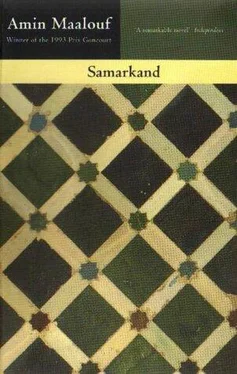‘That day, in the sanctuary, the Samarkand Manuscript was lost under the boots of the Shah’s soldiers.’
Without breaking his flow, Rochefort stood up, leant against the wall and crossed his arms in his favourite pose.
‘Jamaladin was alive but he was ill and above all shocked that so many visitors, who had been listening to him enthusiastically, could have stood meekly by while he was publicly humiliated. He drew some curious conclusions from this — the man who had spent his life denouncing the obscurantism of certain clerics, who had been a regular visitor at the masonic lodges of Egypt, France and Turkey — he made up his mind to exploit the last weapon he had to make the Shah bend no matter what the consequences.
‘So he wrote a long letter to the chief of the Persian clerics, asking him to use his authority to prevent the monarch from selling off the property of the Muslims to the infidels. What happened then, you know from the newspapers.’
I remember that the American press indeed reported that the great pontiff of the Shiites had circulated an astounding proclamation: ‘Any person who consumes tobacco places himself thereby in a state of rebellion against the Mahdi, may God speed his arrival.’ Overnight no Persian lit a single cigarette. The pipes, the famous kalyans were shelved or smashed and tobacco merchants closed up shop. Amongst the wives of the Shah the ban was strictly observed. The monarch panicked, and wrote a letter to the religious chief accusing him of irresponsibility ‘since he was not concerned with the grave consequences which being deprived of tobacco could have on the health of Muslims’. However, the boycott lasted and was accompanied by stormy demonstrations in Teheran, Tabriz and Isfahan. The concession had to be annulled.
‘Meanwhile,’ Rochefort carried on, ‘Jamaladin had left for England. I met him there and had long talks with him; he seemed to be distraught and could only say, time and again: “We must bring the Shah down”. He was a wounded and humiliated man who could think of nothing but avenging himself — all the more so since the monarch, the target of his hatred, had written an angry letter to Lord Salisbury: “We expelled this man because he was working against the interests of England, and where should he take refuge? In London.” Officially the Shah was informed that Great Britain was a free country and that no law could be invoked to suppress a person’s freedom of expression. In private, the Shah was promised that they would seek legal means of restraining Jamaladin’s activity and he found himself being asked to cut short his stay — which made him decide to leave for Constantinople, but with death in his heart.’
‘Is that where he is now?’
‘Yes. I am told that he is deeply dejected. The Sultan has allotted him fine quarters where he can receive friends and disciples, but he is forbidden to leave the country and lives under constant and tight surveillance.’
It was a sumptuous prison with wide-open doors: a palace of wood and marble on the hill of Yildiz, near the residence of the grand vizir; hot meals were delivered straight from the Sultan’s kitchens; visitors came one after another, crossing through a metal gate and walking down an alley before leaving their shoes outside the door. The Master’s voice boomed from above with its grating syllables and closed vowels, he could be heard castigating Persia and the Shah and announcing the evils which would come to pass.
I tried to make myself unobtrusive, being the foreigner — an American with a small foreign hat, small foreign footsteps and my foreign concerns who made the trip from Paris to Constantinople, a trip of seventy hours by train across three empires, in order to ask after a manuscript, an old poetry book, a pathetic bundle of papers in a tumultuous Orient.
A servant came up to me. He made an Ottoman bow, spoke a few words of greeting in French but asked not the slight question. Everyone came here for the same reason, to meet the Master, to hear the Master or to spy on the Master. I was invited to wait in the huge sitting room.
As I entered, I notice the silhouette of a woman. This induced me to lower my eyes; I had been told too much about the country’s customs to walk forward beaming and cheery with my hand outstretched. I simply mumbled a few words and touched my hat. I had already repaired to the other side of the room from where she was sitting to settle myself into an English-style armchair. I looked along the carpet and my glance came up against the visitors shoes, then travelled up her blue and gold dress to her knees, her bust, her neck and her veil. Strangely however, it was not the barrier of a veil that I came across but that of an unveiled face, of eyes which met mine, and a smile. I looked quickly down at the ground, over the carpet again, swept over the edge of the tiling and then went over inexorably towards her again, like a cork coming up to the surface of the water. Over her hair she wore a fine silk kerchief which could be pulled down over her face should a stranger appear. However, the stranger was there and her veil was still drawn back.
This time she was looking into the distance, offering me her profile to contemplate and her skin of such pure complexion. If sweetness had a colour, it would be hers. My temples were throbbing with happiness. My cheeks were damp and my hands cold. God, she was beautiful — my first image of the Orient — a woman such as only the desert poet knew how to praise: her face was the sun, they would have said, her hair the protecting shadow, her eyes fountains of cool water, her body the most slender of palm-trees and her smile a mirage.
Could I speak to her? In what way? Could I cup my hands to my mouth so that she would hear me on the other side of the room? Should I stand up and walk over to her? Sit down in an armchair which was closer to her and risk seeing her smile evaporate and her veil drop like a blade? Our eyes met again, and then parted as if in jest when the servant came and interrupted us — which he did a first time to offer me tea and cigarettes. A moment later he bowed to the ground to speak to her in Turkish. I watched her stand up, veil herself and give him a small leather bag to carry. He went quickly towards the exit and she followed him.
However, as she reached the door of the sitting room she slowed down leaving the man to distance himself from her. Then she turned towards me and stated, in a loud voice and in a French purer than mine:
‘You never know, our paths might meet!’
Whether it was said in politeness or as a promise, her words were accompanied by a mischievous smile which I saw as much as defiance as sweet reproach. Then, as I was getting up out of my seat with the utmost awkwardness, and while I was stumbling about trying to regain both my balance and my composure, she remained immobile, her look enveloping me with amused benevolence. I could not manage to utter a single word. She disappeared.
I was still standing by the window, trying to make out amongst the trees the coach carrying her off when a voice brought me back to reality.
‘Forgive me for having kept you waiting.’
It was Jamaladin. His left hand held an extinguished cigar; he held out his right hand and shook mine with warmth and friendship.
‘My name is Benjamin Lesage. I have come on the recommendation of Henri Rochefort.’
I handed him my letter of introduction, but he slipped it into his pocket without looking at it. He opened his arms, gave me a hug and a kiss on the forehead.
‘Rochefort’s friends are my friends. I speak to them with an open heart.’
Putting his arm around my shoulder, he escorted me towards a wooden staircase which led upstairs.
Читать дальше












